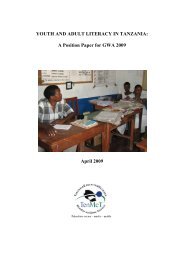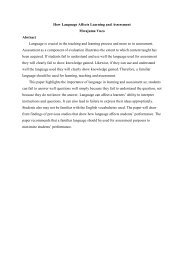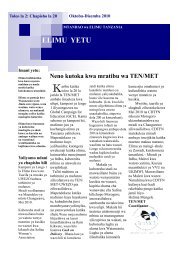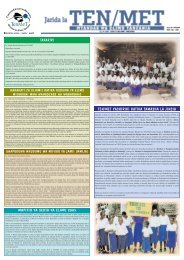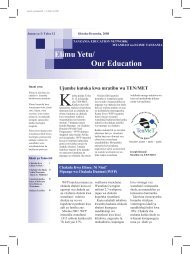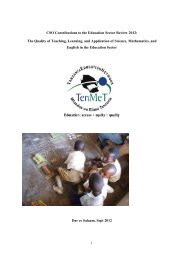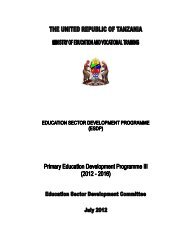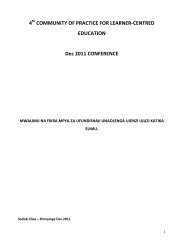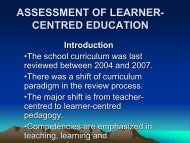A Simple Guide to Working with Finances in Education - Tanzania ...
A Simple Guide to Working with Finances in Education - Tanzania ...
A Simple Guide to Working with Finances in Education - Tanzania ...
Create successful ePaper yourself
Turn your PDF publications into a flip-book with our unique Google optimized e-Paper software.
2.2 What we can learn from a budgetStudy<strong>in</strong>g budgets can help <strong>to</strong> answer the follow<strong>in</strong>g questions:• Adequacy – how much isbudgeted? Is it enough <strong>to</strong> cover thecost of carry<strong>in</strong>g out the policy?• Priority – how does the budget foreducation compare <strong>to</strong> resourcesspent <strong>in</strong> other areas? A governmentcould make promises (policycommitments) <strong>to</strong>wards a particularpolicy, but if this is not reflected <strong>in</strong>the budget it is not keep<strong>in</strong>g itspromises. Look<strong>in</strong>g at what receivesthe most and the least amounts ofmoney <strong>in</strong> an overall budget showyou where the priorities really lie.When you are look<strong>in</strong>g just at the amontrecorded <strong>in</strong> a budget <strong>in</strong> shill<strong>in</strong>gs or dollarsit is called “Nom<strong>in</strong>al terms’. If you arelook<strong>in</strong>g at a budget which comparesseveral years, it is important <strong>to</strong> know ifwhat you are look<strong>in</strong>g at has been adjusted<strong>to</strong> take <strong>in</strong>flation <strong>in</strong><strong>to</strong> account. If it hasn’t,you might th<strong>in</strong>k that the numbers aregrow<strong>in</strong>g up and up, but <strong>in</strong> fact what youcan buy <strong>with</strong> a certa<strong>in</strong> amount of moneyhas gone down. If the numbers you arelook<strong>in</strong>g at have taken <strong>in</strong>flation <strong>in</strong><strong>to</strong>account they are acalled ‘Real terms’.• Progress – is the government’s response <strong>to</strong> meet<strong>in</strong>g educationneeds improv<strong>in</strong>g? It is not always possible <strong>to</strong> make changehappen very fast, but by look<strong>in</strong>g at this years budget <strong>in</strong>comparison <strong>with</strong> last years or the one from five years ago, youcan tell if changes are be<strong>in</strong>g made.• Equity – are resources be<strong>in</strong>g allocated fairly? For example,school<strong>in</strong>g <strong>in</strong> some parts of the country is much <strong>in</strong> advance ofprovision <strong>in</strong> other parts. Is fund<strong>in</strong>g be<strong>in</strong>g used <strong>to</strong> even up thesehis<strong>to</strong>ric differences, or is it be<strong>in</strong>g allocated <strong>in</strong> a way whichma<strong>in</strong>ta<strong>in</strong>s these differences or even makes them worse?• Efficiency – is the money be<strong>in</strong>g spent efficiently. Is there a big difference betweenallocation and actual expenditure? - If so money is not be<strong>in</strong>g spent and put <strong>to</strong> gooduse. There are also different means of gett<strong>in</strong>g money down <strong>to</strong> district and schoollevel, such as block grants or tied grants. Block grants would give freedom <strong>to</strong> districts<strong>to</strong> decide how <strong>to</strong> spend resources <strong>in</strong> order <strong>to</strong> meet local needs. Tied grants directexactly how money must be spent. Capitation and development grants at school levelare tied, as they come <strong>with</strong> strict directions about how money can be allocated.• Effectiveness – is the money be<strong>in</strong>g spent on the right th<strong>in</strong>gs? For example, if theobjective is improved levels of education achievement, where do you allocatespend<strong>in</strong>g <strong>to</strong> have the biggest impact on learn<strong>in</strong>g achievements? Classrooms,teachers, teacher tra<strong>in</strong><strong>in</strong>g…?To be able <strong>to</strong> answer these questions, though, it’s necessary <strong>to</strong> understand howbudgets should work.4



